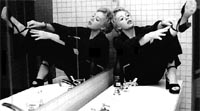
Little Shots of Happiness
Written by Chris Cooke | Posted by: Anonymous
A young woman lies in bed, a drop of blood welling under one nostril. "Frances," She says, in voiceover. "Frances Collins. I’ve been married five years and that still sounds like someone else’s name." So begins Todd Verow’s "Little Shots of Happiness." After showering and rehearsing happy faces in front of the mirror, Frances leaves her wedding ring on top of the medicine cabinet, throws some clothes into a suitcase, walks out the door, and goes… well, she goes to work. Work for her means drearily manning the phones at a Boston collection agency, where she is a long-term employee in a job fit for no one. Apparently, she’s a glutton for punishment, faithful beyond reason – – which is why, perhaps, she can’t bring herself to leave Boston altogether or even find another apartment. Still tied somehow to husband and home, she lives out of an office bathroom, sleeping wherever, with whomever, she can. She sticks around, but she goes wild, as if to purge herself of her marriage through excess. She starts smoking. She drinks. Heavily.
With a start like that, "Little Shots of Happiness" could have been no more than your run-of-the-mill good-girl-gone-bad flick, were it not for Verow’s fine direction and an excellent performance by Bonnie Dickenson as Frances. Verow sets his characters in front of the camera, almost Warhol-like, and lets them interact. There are no easy or contrived encounters here, only awkward, cautious meetings, as the characters awkwardly try to discover themselves in relation to the people they meet. The result is intimate Cassavetes-like realism, full of tenderness and honesty. Dickenson subtly plays Frances as both vulnerable and brassy, fragile yet resilient. We see her fumble through flirtatious lies and clumsily try on different versions of herself, wearing different outfits, using different names. Above all, we see her willfully losing control, cracked and wounded, staggering towards emancipation.
We have to take a few minor leaps of faith, of course, in order to believe all this. Her husband never tries to contact her at work, for instance. Nor do her co-workers notice that she wears the same outfit every day. And where does she shower? Or do laundry? Evidently, she can drink all night and still wake up in time to show up for work, no one the wiser. But these are petty concerns. The film’s only major blunder involves the husband, the only character here who seems composed less of flesh and blood than of the necessities (or conveniences) of plot. At the moment when he makes his inevitable entrance into the story, we don’t know enough about him or the context of their relationship to understand or care about his actions.
Luckily, this isn’t his film, and his crudely drawn character doesn’t mar the film. "Little Shots of Happiness" is a revealing and empathetic portrait of a woman teetering on the brink, sometimes playfully, often with desperation. All in all, it’s a refreshing and engaging film.
'Little Shots of Happiness' won the Grand Jury Prize at the Long Island Film Festival and the Special Award for Innovative Cinema at the New England Film Festival.










